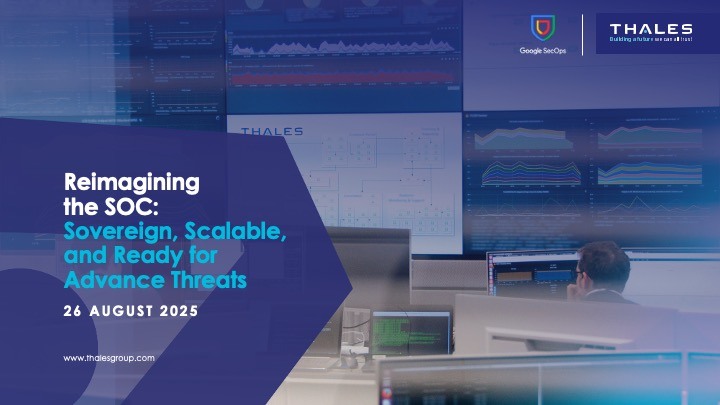Posted by
Share this article
The cyber security landscape is shifting faster than ever before. With the rise of scalable AI-driven attacks, traditional security operations centres (SOCs) must evolve to keep pace.
In this webcast, Thales Cyber Services’ Detect and Response Lead, Parambir Ahuja, explains why reimagining the SOC is no longer an option but a necessity. He unpacks the topic in the context of Thales’s partnership with Google SecOps, highlighting how Thales works with trusted partners to deliver cutting-edge SOC solutions.
View Webinar:

How to Modernise Your SOC (Step-by-Step)
1. Assess your current SOC capabilities and identify gaps.
2. Integrate AI-driven tools for threat detection and response.
3. Partner with trusted providers for sovereign, scalable solutions.
4. Ensure compliance with regulations (e.g., SOCI Act, PSPF, ISM).
5. Continuously monitor, test, and update your SOC processes.
Why are SOCs important?
SOCs are the nerve centre of cybersecurity operations.
They provide 24/7 visibility into an organisation’s IT environment, monitoring networks, servers, endpoints, databases, and applications to detect suspicious activity.
They use tools like SIEM (Security Information and Event Management), threat intelligence, and automation to identify unusual behaviours and don’t just detect threats, but also coordinate rapid response, helping contain incidents before they escalate into major breaches.
A SOC brings together security analysts, engineers, and incident responders, with this concentration of expertise leading to faster, more informed decision-making.
In short, SOCs are important because they provide proactive protection, rapid incident response, and compliance assurance.
How are SOCS evolving?
Due to the dynamic cyber threat environment and shifting regulatory space, SOCs continue to evolve.
Modern SOCs have expanded beyond detecting and responding to incidents after they have occurred, shifting toward threat hunting, risk analytics, and proactive defence, using behavioural analysis and predictive intelligence to identify unusual activity before it becomes an incident.
Sophisticated AI models, machine learning, and Security Orchestration, Automation, and Response (SOAR) are reducing analyst workload. Natural language queries, automated alert enrichment, and AI-driven triage are helping SOCs handle the overwhelming number of alerts, reducing the time taken to detect and respond to threats.
And, with organisations increasingly operating across multi-cloud and hybrid environments, SOCs are moving away from on-premise, siloed systems. In this regard, partnerships with hyperscalers like Google is essential.
Leveraging Google SecOps for next-generation defence
To counter AI-enabled threats, Thales has partnered with Google SecOps, harnessing the power of a unified Security Information Management (SIM) and SOAR platform.
Google SecOps provides 365-day log storage by default and delivers lightning-fast search capabilities built on Google’s core search technology. Analysts benefit from integrated Mandiant and VirusTotal threat intelligence, Gemini AI for accelerated detection, and risk analytics to spot unknown threats.
The platform’s vendor-neutral design ensures seamless ingestion of AWS, Azure, and Office 365 logs.
Smarter investigations, faster response
In live demonstrations, the Google SecOps platform stands out for its usability and AI-driven capabilities. Analysts can generate natural language queries to streamline investigations, automate alert enrichment with contextual threat intelligence, and collaborate through integrated chat.
Dashboards and use cases are fully customisable, and one-click response actions, like disabling users or blocking URLs, enable rapid containment. Automated incident summaries and reporting powered by AI reduce analyst fatigue and boost efficiency, while marketplace integrations extend response automation.
Sovereign security, tailored to clients
Thales Cyber Services is fully sovereign, which is built around partnerships and underpinned by our work in national security, not outsourcing. This is an essential consideration for organisations captured by Australia’s Security of Critical Infrastructure Act 2018 (SOCI Act), which has strict 12 to 72-hour cyber incident reporting requirements.
It is also important for government clients captured by the Protective Security Policy Framework (PSPF) and the Information Security Manual (ISM).
Thales’s approach is focussed on the provision of meaningful, actionable alerts rather than overwhelming volumes, with hybrid and fully managed options available to suit client needs.
The future of the SOC
As we move forward, AI will continue to both empower defenders and enable attackers.
The organisations that succeed will be those who can adapt quickly, blending sovereign expertise with cutting-edge technology.
Thales Cyber Services, supported by Google SecOps, is reimagining what a SOC can be – sovereign, intelligent, and ready for the age of scalable AI threats.
Click here to speak to us today about how our SOC services can assist uplift your business security posture.
Written by Parambir Ahuja - Detect and Respond Lead
Parambir has 20+ years in cybersecurity, specialising in SOC modernisation from his leadership roles at enterprise IT and cybersecurity organisations.
Contact us
Speak with a Thales Cyber Services ANZ
Security Specialist
Thales Cyber Services ANZ is a full-service cybersecurity and secure cloud services provider, partnering with clients from all industries and all levels of government. Let’s talk.



